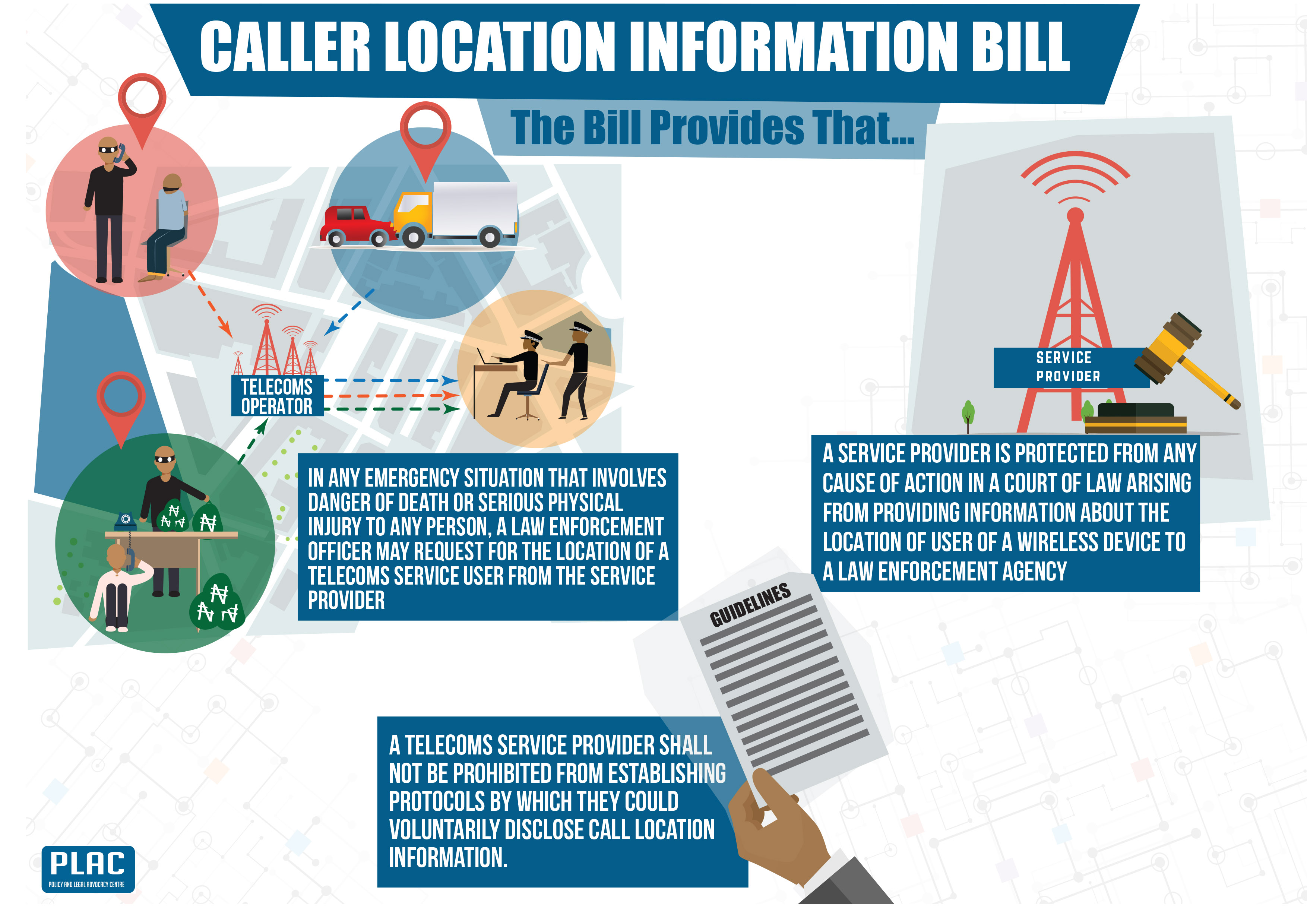HB 347: Caller Location Information Bill, 2016
Download Bill Bill Analysis Download Bill Analysis Infograph
Sponsor:
Hon. Igariwey Iduma Enwo
State:
EBONYIParty:
Peoples Democratic PartyBill Status: Awaiting Committee Report
- First Reading: 20/01/2016
- Second Reading: 27/10/2016
- Committee Referred To: Committee on Telecommunications
- Consolidated with:
- Date Reported out of Committee:
- Third Reading:
- Reconsidered and Passed:
Bill Analysis:
SHORT TITLE
Caller Location Information Bill (HB 347)
OBJECTIVE OF THE BILL
The objectives of the Bill are: -
- To provide call location information concerning the user of a telecommunication service in an emergency situation to a law enforcement official, in order to respond to a call for emergency;
- To provide caller location information (or do a ping locate) in an emergency situation that involves danger of death or serious physical injury to a person where disclosure of communications relating to the emergency is required without delay.
NUMBER OF CLAUSES/PARTS
The Bill has 4 Clauses including short title
BILL IMPLICATION
When the Bill is passed: -
- The location of a person using a wireless communication device or any other form of telecommunication service can be disclosed by a service provider upon request by a law enforcement agency;
- A law enforcement agent or official may in an emergency situation, respond to a call by a service provider or subscriber by accessing their caller location;
- No cause of action shall lie in any Court of law against any telecommunications carrier or service provider for providing assistance to a law enforcement officer in accordance to the provision of this Bill;
- Nothing shall prohibit a telecommunications carrier or service provider from establishing protocols by which they could voluntarily disclose call location.
CONTENTS OF THE BILL
1. Unrestricted Access to Caller Information: - The Bill provides under Clause 1 that upon request, a law enforcement agent or officer may access the location of a user of a telecommunications device or wireless communications service.
2. Response to an Emergency Situation: -. The Bill also provides that a law enforcement officer or agent may access the location of a user who requests for assistance or intervention in an emergency situation that involves serious physical harm or death through a service provider, who shall provide caller location information.
3. Exemption from Cause of Action: - Clause 2 of the Bill exempts a service provider or telecommunication service industry from any action in any Court of Law for providing information, facilities or assistance to a law enforcement officer or agency in accordance with the provisions of this Bill.
HUMAN RIGHTS IMPLICATION
- Constitutional Right to Privacy: The 1999 Constitution (as amended) under Section 37, provides for the fundamental right of citizens to “the privacy of their homes, correspondence, telephone conversations and telegraphic communications…”
The Caller Location Information Bill may be interpreted as violating this right guaranteed by this Section of the Constitution; however, the Bill stipulates that this can only be done during emergencies. The Bill needs to elaborate more on this fundamental right and how it would be protected pursuant to the provisions of the Bill.
ANY SIMILAR BILLS
Telecommunications Facilities (Lawful Interception of Information) Bill 2015 sponsored by Hon. Uzoma Nkem-Abonta (HB. 35)
CONCLUDING ISSUES
The Caller Location Information Bill is a short Bill, which seeks to avail security operatives and telecommunications operators a platform for tracking the location of users of communication devices in situations where lives of innocent persons are at stake.
Clause 1 of this Bill could be interpreted to conflict with Section 37 of the 1999 Constitution (as amended); however more clarity in the structure of the Clause, detailing how the Bill would protect this right and still achieve its objectives would suffice.
The Bill also lacks details in the processes and parameters of operation. It is not clear what phone number will trigger the tracking or access of user location. It is also not clear at what point the security agency would start tracking, if the user did not place a call to an emergency line (if any).
The limitations to the powers of the security agencies to access caller location information are not listed. Also the Bill should give effect to the protection of the right to privacy as guaranteed under the 1999 Constitution (as amended), while noting the emergency situations that would amount to exceptions.
Though Clause 2 protects the service providers from any cause of action in a court of law, the Bill is silent on exceptions, should the service provider avail caller information unduly or should a security agent request for caller information in a non-emergency situation; and the penalty for not complying with the provisions of the Bill.
Tracking a caller’s location in a time of emergency is important, however it is crucial to provide parameters for operation to avoid abuse and protect the citizens’ fundamental right to privacy.
Infographic:
